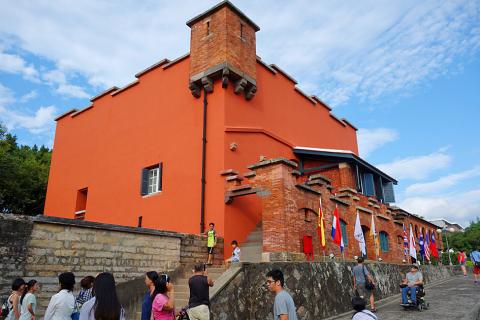The “Old Dutch Fort” in Fort San Domingo yesterday officially reopened after being closed for almost two years for restoration.
The landmark in New Taipei City’s Tamsui District (淡水), also known as Fort Antonio, was closed for renovation in January last year as widespread repairs were needed to fix leaking roofs and decaying exterior walls.
Repair work was finished in the middle of last month, followed by a one-month inspection by Tamsui Historical Museum officials.

Photo: Yeh Kuan-yu, Taipei Times
The museum, which is in charge of the national historic site, held a ceremony yesterday to celebrate the reopening of the fort — on the 370th anniversary of its establishment — as well as National Heritage Day and the museum’s own 11th anniversary.
Workshop in Heaven Theater (黑門山上的劇團) performed a play on the stories related to Fort San Domingo as part of the celebration.
The fort has been renovated three times, including the latest effort, museum officials said.
Water had infiltrated the fort’s structure because the roof could not drain properly, museum officials said, adding that the walls, which are about 1.7m thick, trap humidity inside the building, leading to cracks and decay, while the wooden floors had become moldy.
The restoration team also worked to ensure that the paint on the exterior walls resembled the one used by the Dutch builders, which turned out to be a challenge.
Museum officials said they sent paint samples taken from the walls before the 1985 restoration effort, after that restoration and after the 2004 restoration to be analyzed at a laboratory in Germany.
Based on its analysis of those samples, the laboratory suggested four colors for members the restoration supervisory committee to choose from for the exterior paint.
Fort San Domingo was established in 1629 by Spanish forces occupying northern Taiwan.
The original structure was destroyed during a nighttime attack in 1636 launched by Chinese merchants from China’s Fujian Province, who were upset by the taxes that the Spanish governor had imposed on their businesses.
The Spanish rebuilt the fort, which suffered major damage during a war with Dutch forces.
The Dutch rebuilt the fort after they ousted the Spanish from northern Taiwan, completing reconstruction in 1646, when the installation was renamed Fort Antonio.
As the locals called the Dutch “the red-haired people,” the fort became known as the “fort of the red-haired people” (紅毛城).

Chinese Nationalist Party (KMT) Chairman Eric Chu (朱立倫), spokeswoman Yang Chih-yu (楊智伃) and Legislator Hsieh Lung-chieh (謝龍介) would be summoned by police for questioning for leading an illegal assembly on Thursday evening last week, Minister of the Interior Liu Shyh-fang (劉世芳) said today. The three KMT officials led an assembly outside the Taipei City Prosecutors’ Office, a restricted area where public assembly is not allowed, protesting the questioning of several KMT staff and searches of KMT headquarters and offices in a recall petition forgery case. Chu, Yang and Hsieh are all suspected of contravening the Assembly and Parade Act (集會遊行法) by holding

PRAISE: Japanese visitor Takashi Kubota said the Taiwanese temple architecture images showcased in the AI Art Gallery were the most impressive displays he saw Taiwan does not have an official pavilion at the World Expo in Osaka, Japan, because of its diplomatic predicament, but the government-backed Tech World pavilion is drawing interest with its unique recreations of works by Taiwanese artists. The pavilion features an artificial intelligence (AI)-based art gallery showcasing works of famous Taiwanese artists from the Japanese colonial period using innovative technologies. Among its main simulated displays are Eastern gouache paintings by Chen Chin (陳進), Lin Yu-shan (林玉山) and Kuo Hsueh-hu (郭雪湖), who were the three young Taiwanese painters selected for the East Asian Painting exhibition in 1927. Gouache is a water-based

Taiwan would welcome the return of Honduras as a diplomatic ally if its next president decides to make such a move, Minister of Foreign Affairs Lin Chia-lung (林佳龍) said yesterday. “Of course, we would welcome Honduras if they want to restore diplomatic ties with Taiwan after their elections,” Lin said at a meeting of the legislature’s Foreign Affairs and National Defense Committee, when asked to comment on statements made by two of the three Honduran presidential candidates during the presidential campaign in the Central American country. Taiwan is paying close attention to the region as a whole in the wake of a

OFF-TARGET: More than 30,000 participants were expected to take part in the Games next month, but only 6,550 foreign and 19,400 Taiwanese athletes have registered Taipei city councilors yesterday blasted the organizers of next month’s World Masters Games over sudden timetable and venue changes, which they said have caused thousands of participants to back out of the international sporting event, among other organizational issues. They also cited visa delays and political interference by China as reasons many foreign athletes are requesting refunds for the event, to be held from May 17 to 30. Jointly organized by the Taipei and New Taipei City governments, the games have been rocked by numerous controversies since preparations began in 2020. Taipei City Councilor Lin Yen-feng (林延鳳) said yesterday that new measures by